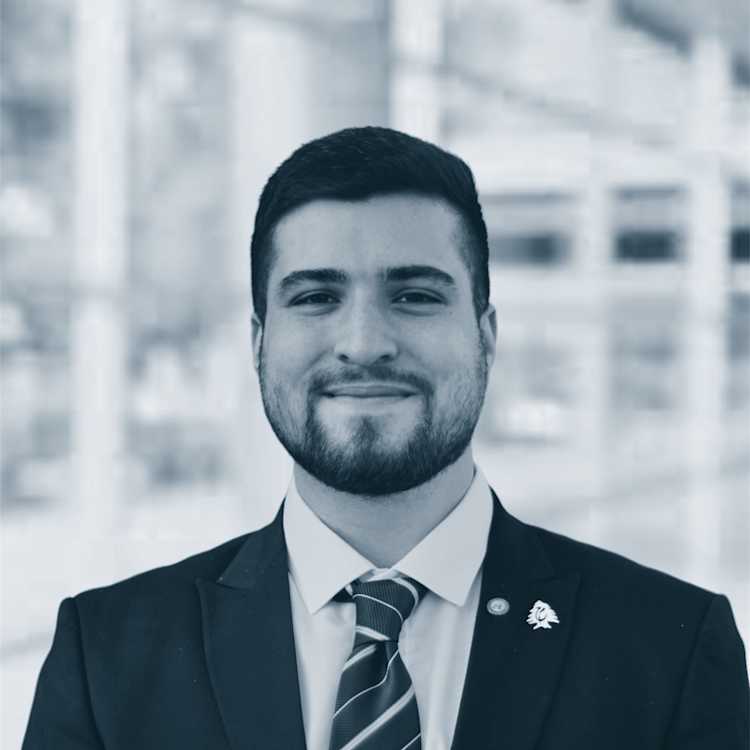Spotlight on... | 13/02/2024
Spotlight on … New Representatives of Doctoral Researchers Adhiraaj, Alina, and Houssein
In the General Assembly of the Doctoral Researchers last December, Adhiraaj Anand, Alina Ripplinger, and Houssein Al Malla were elected to be the new representatives of the Doctoral Researchers from 2024 onwards. In this interview, they introduce themselves, their motivation to run for office, and issues important to them.
Adhiraaj joined the GIGA Doctoral Programme in October 2023 and is a Doctoral Researcher at the GIGA Institute for Asian Studies. For his PhD, he is researching youth politics and transnational political engagement in Taiwan, Thailand, and Malaysia and belongs with this topic to the Research Programme on Accountability and Participation.
Alina is part of the GIGA Team and the Doctoral Programme since November 2022. She is currently working on her dissertation titled “Countering the authoritarian turn: Diagonal controls under human rights law as a last resort in Nicaragua” and is part of the DEMINGS project, which deals with Democratic Institutions in the Global South.
Houssein first joined the GIGA in 2021 as a student research assistant as part of a research project on Sanctions. In October 2022, he joined the GIGA Doctoral Programme, where he does research at the intersection of International Relations and Political Psychology. His dissertation seeks to investigate to what extent does the personalities of sanctioned leaders affect the outcomes of imposed sanctions.
What made you decide to run as a representative of the Doctoral Researchers?
Alina: In my experience, the dynamism and ambition of the PhD students at GIGA is very enriching. As a representative, I hope to bring this excellent group together and channel our ideas.
Adhiraaj: I too think we have an amazing community of PhD students at the GIGA. Everyone I have met is working on a fascinating topic and has done or is doing other cool things! I am excited to work to enrich everyone’s experience here.
Houssein: Deciding to throw my hat in the ring for a second term as a representative of doctoral researchers at the GIGA came to me almost instinctively. Despite the time commitment the role requires, the satisfaction of making a tangible difference in the lives and experiences of my peers has been a significant motivator. Over the past year, I have been fortunate to build strong, effective relationships with both the administration and the doctoral community at the Leibniz level as whole. These relationships have not only enriched my experience but have also placed me in an ideal position to advocate effectively and bring about meaningful changes. I believe that leveraging these established connections will enable me to get even more done for our doctoral programme in the coming year.
How would you describe your main tasks and responsibilities as representatives of the Doctoral Researchers?
Adhiraaj: Our role is to speak for doctoral researchers; to listen to doctoral researchers, understand their concerns and work with the administration to address them. We will work to make their experience as comfortable and fun as possible.
Houssein: Adhiraaj formulated the answer very eloquently. Our main responsibility will always be ensuring that the doctoral researchers at the institute are having as smooth of a journey as possible. Academia, especially at the junior level, can often be a very anxiety-inducing experience. That is why having structures such as a platform with dedicated doctoral representatives that the GIGA offers to its researchers is an increasingly important channel to voice concerns and work together on always improving the experience of the researchers involved.
What are central topics you would like to address, and what do you hope to achieve during your term as representatives?
Alina: First, I strongly intend to plan a PhD retreat based on my experience with the recent joint Erfurt-GIGA format. I would love to gather interesting topics, motivated people, and add some coffee and Franzbrötchen. Second, I look forward to building on the great work of our predecessors with their survey on supervision. There is a lot of potential to work towards more dialogue, collaboration, and equal opportunities for all PhD students. Finally, many internationals struggle when arriving in Germany, or even before, and must invent (sometimes almost unbelievable) strategies to cope with the German bureaucratic jungle. As representative, I hope to come up with some alternatives.
Houssein: Alina summarised it very well. There are definitely so many things we want to address and setting our concrete agenda as doctoral representatives is often a daunting task. One thing is for sure a cornerstone for me: ensuring that our doctoral researchers are protected and able to cope with the current political landscape. It is no secret that Germany is currently facing a threat of the rise of right-wing extremism. Being able to provide the resources for our international community to stay strong during this time is a crucial step. A huge shoutout to the GIGA here for training and preparing a team of peer mental health responders – a very important step in the right direction.
Contact

GIGA Doctoral Programme
The GIGA has a long tradition of integrating young scholars into its research matrix. This culminated in the establishment of the GIGA Doctoral Programme, which seeks to provide a platform for both German and international early-career academics. Herewith they can pursue continued professional development and their own research, particularly in the field of Comparative Area Studies.
Doctoral Programme

